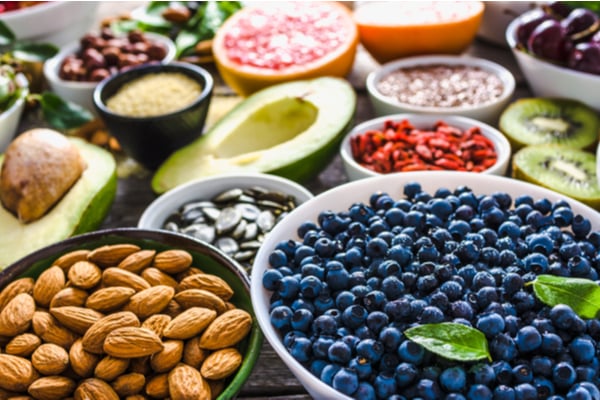This complex system of beneficial microbes might seem difficult to understand, so let’s break it down.
What is the Gut Microbiome?
Here’s some news that might surprise you; your body has more bacteria than human cells. You have approximately 40 trillion bacterial cells within your system, and a mere 30 trillion human ones. Everyone carries up to two kilograms (kgs) of microbes within their gut, which breaks down to an estimated 10,000 unique species and tens of trillions of individual organisms. And, while a third of this concentration of bacteria is the same for most people, up to two-thirds are unique to you, almost like a digestive fingerprint.
When referenced collectively, these microbes are known as your gut microbiome. They create an “ecosystem” composed of both symbiotic and pathogenic bacteria that dwell together. Some of these bacteria merely tag along without contributing much to your body, while others are helpful or harmful to your wellbeing. By keeping your microbiome well-balanced through a healthy lifestyle, you can prevent potentially dangerous microbes from becoming established.
When functioning well, your gut microbiome will:
- Aid the digestive process for foods that are challenging for the stomach or small intestine to digest
- Help your system produce and utilize B and K vitamins
- Prevent pathogenic microorganisms from invading
- Bolster the immune system to control how it responds to infections
- Help break down fiber to improve your health
- Improve central nervous system functioning for better brain health.
Note: While microbes in the microbiome can also include viruses, fungi and other forms of microscopic organisms, bacteria are the most studied and what we are primarily referencing in this article.
What Forms the Gut Microbiota?
Though your body’s microbiome is as crucial for your health as an organ, it’s not something you are born with. Babies leave the womb with nearly sterile digestive systems, and the bacterial colonization begins immediately after birth because of contact with microorganisms from their mother’s vagina, skin and breast milk. From as early as day three, a baby’s gut composition will look different depending on whether they drink breast milk or bottled formula. As an example, drinking breast milk increases the amount of beneficial Bifidobacteria within a baby’s gut.
As you age, your gut microbiome will continue to grow in complexity as you become exposed to new species of microbes.
Get Your Free Guide to the Top 50 Anti-Inflammatory Foods
Eight Benefits of a Healthy Microbiome
When you eat a meal, your stomach and small intestine will inevitably struggle to digest certain compounds within it. This is where microbes come into the picture. Many varieties work to break down the particles in your food, which helps your system extract the vitamins and nutrients it contains.
However, these bacteria do even more for your health. Below are some of the most significant benefits of maintaining a well-functioning microbiome.
1. Maintains Your Metabolism
A balanced gut microbiome controls a variety of metabolic functions that aid digestion. For instance, gut bacteria help your system extract vitamins, synthesize amino acids, and process insoluble fiber and resistant starches. This gives your system the energy it needs to maintain a healthy metabolism.
2. Promotes a Stronger Immune System
When your microbiome is populated with beneficial microbes, there’s less room for pathogens to establish themselves. Some kinds of bacteria also produce antimicrobial substances called bacteriocins that inhibit the growth of competing microbes. This is called the competitive-exclusion effect, and it helps promote a stronger immune system. A lacking microbiome can lead to problems, as young children with allergies often have different compositions of intestinal bacteria than their peers who don’t.
3. Improves Heart Health
A well-balanced gut microbiome can improve your heart health. One study of 1,500 people found that their digestive bacteria influenced their “good” HDL cholesterol and triglyceride levels, which affected the functioning of their cardiovascular system. Likewise, certain pathogenic microbes produced trimethylamine N-oxide (TMAO), a compound that can build up and block arteries, potentially triggering heart attacks and contributing to heart disease.
4. Controls the Gut-Brain Axis
Your stomach and brain have a direct connection known as the gut-brain axis. This communication system impacts the signaling between the two organs, and it also creates a potential pathway for digestive bacteria to influence the brain, and vice versa. Recent research reveals that stress and depression affect the makeup of your gut microbiota, and its functioning will affect your mood.
5. Reduces Risk of Weight Gain
The type of bacteria that reside within your gut impact your risk of obesity and other metabolic conditions. A 2014 study revealed that your genetics play a role in what bacteria are in your stomach and that some types are found more often in thinner people. For instance, Christensenellaceae minuta (a strain of bacteria influenced by genes) is more common in those with low body weight. Even more revealing, tests with mice suggest that introducing this type of bacteria into the digestive system can cause you to gain less weight and potentially prevent obesity.
Likewise, a lack of bacteria in the large intestine can slow down the activity of brown fat, which can cause you to burn fewer calories and gain weight. The evidence is still forthcoming about the direct relationship between gut bacteria and obesity, but the connection is worth exploring further.
6. Plays a Role in Autism Symptoms
Autism research today seemingly introduces more questions than answers, but the role of gut bacteria is gaining extra scrutiny. A 2013 study found that children with autism had lower levels of three types of digestive microbes (Prevotella, Coprococcus, and Veillonellaceae) than other children. Likewise, the concentrations of byproducts produced by specific types of gut bacteria in the fecal material of autistic children were statistically different than those without it. This leads researchers to speculate that gut microbes make a significant impact on the connection between the gut and the brain, and potentially affect brain functioning.
7. Affects Cancer Development (and Treatment)
Recent research shows a strong link between gut bacteria and cancer. A 2013 study shows that the presence of Lactobacillus johnsonii in the intestines might impact your risk of developing lymphoma. Further research shows that the gut bacteria Helicobacter pylori might deactivate your immune system’s ability to regulate inflammation, potentially triggering ulcers and stomach cancer. Likewise, other reports have found that certain strains of gut bacteria can improve the effectiveness of cancer treatment like chemotherapy.
8. Plays a Role in Mental Health
Gut bacteria is a factor in your mental state, as the microbes produce a variety of neurochemicals that are used to regulate your brain’s physiological and mental state. According to reports from the American Psychological Association, 95% of your body’s serotonin supply (a compound that affects mood and happiness) is produced by gut bacteria.
How to Promote a Healthy Microbiome
How can you improve your digestive system’s bacterial levels? While most healthy people have relatively similar microbiomes, your lifestyle, environmental exposures, and diet will all make a difference in its precise makeup. While there is still a lot to learn about what influences your digestive microbial makeup, research shows that one of the best ways to work towards improvements is changing what you eat.
Optimal Diet for Better Gut Health
If you’re ready to make a positive change for your microbiome, your diet is the best place to start. Every meal presents a new opportunity to affect your intestine’s microbe population, so follow these suggestions to keep it filled with beneficial microbes.
- Avoid Sugar and Processed Foods: Refined carbohydrates and processed foods break down quickly in your small intestine without the help of microbes. This causes them to go hungry and potentially begin breaking down the cells that line your organs. This allows particles of food to break through the walls, enter your bloodstream, and trigger inflammation. To prevent problems, avoid these foods altogether.
- Eat Leafy Greens and Low-Sugar Fruits: For gut health, try to get your carbohydrates from fresh produce. Smart options include kale, spinach, radishes, leeks, asparagus, carrots, garlic, and turmeric. If you plan to eat grains, stick to varieties with plenty of fiber and beneficial carbs like beta-glucan, which your gut bacteria can digest.
- Try a Food Elimination Diet: If you aren’t sure what food is triggering your digestive problems, consider a food elimination diet. You can remove common foods from your diet (like dairy, soy, wheat, eggs, nuts, and corn) for a week or more and see if your symptoms improve. For better results, stay away from alcohol, caffeine, and artificial sweeteners as well.
- Consume Fermented Foods: Thanks to their probiotic content, fermented foods are a smart way to seed your stomach with beneficial bacteria. Strive to fill your diet with sauerkraut, kimchi, kefir, yogurt, pickles, and other fermented foods.
- Take Probiotics: You can improve your digestive bacteria levels by supplementing your natural levels with quality probiotics. This is especially beneficial after a round of antibiotics, as it helps you replenish your system’s depleted bacteria supply with beneficial microbes.
- Eat Prebiotic Foods: Though probiotics get most of the attention, prebiotic foods will also improve your microbiome. Prebiotics are a type a fiber that stimulate the growth of beneficial bacteria, and they can be found in bananas, oats, apples, artichokes, and more.
- Breastfeed Babies for Half a Year: Regarding digestive bacteria, infants are essentially born as a blank slate. That’s why breastfeeding is critical for developing a healthy microbiome, as it introduces bacteria from mom’s system to her baby’s.
- Fill Up on Polyphenols: As the plant compounds found in green tea, olive oil, red wine, and dark chocolate, polyphenols are broken down by the microbiome to promote the growth of beneficial bacteria.
Balance Your Microbiome for Better Health
The state of your digestive system has wide-reaching consequences for your health, which is why monitoring your microbiome is essential for optimal wellness. By paying attention to what you eat and how it makes you feel, you can encourage the presence of good gut bacteria. Taking time to build awareness about what works for your body will benefit you in a multitude of ways.
Sources
http://www.gutmicrobiotaforhealth.com/en/about-gut-microbiota-info/




